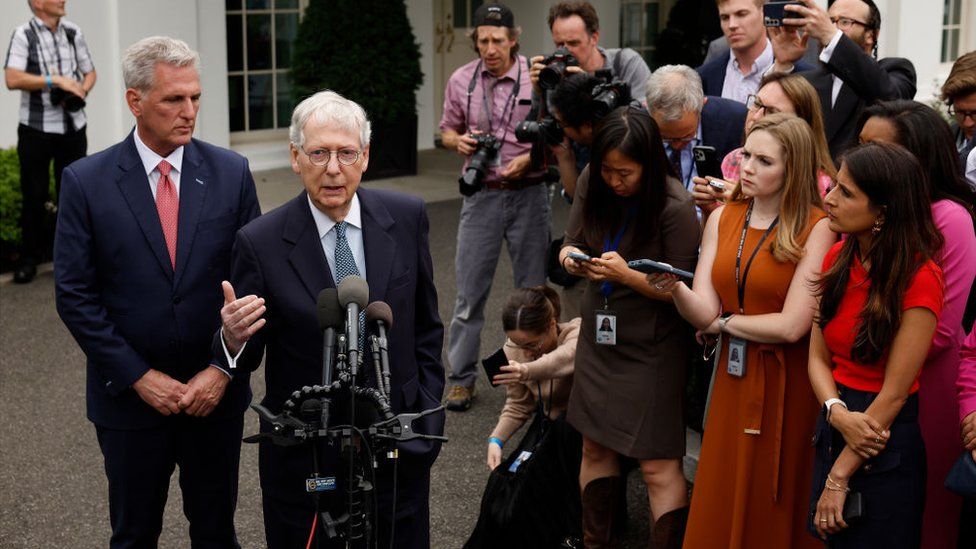
What’s on the table in the US debt ceiling talks

Republicans demands include an increase in work requirements and the reallocation of Covid funds
By Anthony Zurcher
North America correspondent
Joe Biden and congressional leaders from both parties met at the White House on Tuesday to discuss raising the limit on new debt the US can issue. It marks the second week of in-person discussions to prevent a default – a potential scenario that comes with dire predictions of global financial chaos.
According to the US Treasury Department, the government could run out of funds by 1 June, leading to missed monthly retirement payments to the elderly, delayed pay cheques to federal employees and the military, shuttered government offices, and a spike in interest rates as US creditworthiness tumbles.
After a week of behind-the-scenes staff discussions, the contours of a deal have started to take shape – although virtually any agreement is fraught with political risk for both sides.
Here are the key issues reportedly under consideration.
Low-hanging Covid funds
The US treasury currently has billions of dollars in unspent funds allocated to support businesses and state and local governments deal with the Covid-19 pandemic.
With the public health emergency now officially over, Republicans have sought to have the pot of money returned to the federal government.
Mr Biden has in the past expressed openness to such a move, given that the funds have no clear purpose at this point and the removal will not directly impact any entrenched programmes or interests.
It’s the lowest-hanging fruit in the debt limit negotiations.
Reforming energy permitting
Another topic of discussion is streamlining the process by which the federal government grants permits to private companies for energy development. This is a key interest for Democratic Senator Joe Manchin of coal-rich West Virginia – a pivotal swing vote in the narrowly divided US Senate.
Mr Manchin thought Democrats had already agreed to similar reforms as part of the negotiations for his support of Mr Biden’s legislation last autumn, which increased green energy investments and healthcare spending. Congress never actually approved his measures, however, as environmentalists flexed their muscle within the Democratic Party.
Republicans are keen on pushing this through and, now that they have a share of power, they could make it part of a debt-limit package.
Given that Democrats already half-swallowed that pill last year, it may be a manageable concession.
Federal budget caps
Trickier for Mr Biden to agree to is caps on the amount of spending assigned in the upcoming 2023-24 budget.
While the caps are more like non-binding guidelines for setting the federal budget and could be changed during the process by which government spending is actually assigned to specific programmes, the figures set in these negotiations would help frame the contours of the debate when legislators sit down later this year to hash out exact dollar amounts that flow from federal coffers.
What Mr Biden and the Democrats would hope to avoid – and Republicans have sought – are actual cuts in federal spending, particularly to new programmes and spending the Democrat-controlled Congress approved during the first two years of Mr Biden’s presidency.
Watch: The debt ceiling explained – in under 90 seconds
Work requirements for the poor
Perhaps the biggest sticking point during the current debt-limit talks is the Republican proposal that people below or near the poverty line should be actively seeking work or enrolled in an education programme if they receive food, financial and health-insurance aid.
Conservatives frequently complain that government aid to the poor is rife with fraud and encourages individuals to stay out of the workforce. They have sought to raise the maximum age for existing work requirements in poverty programmes from 49 to 55 and to limit the ability of states to offer exemptions to the mandate.
Democrats view the support as an integral part of Mr Biden’s expanded federal social safety net, which they cite as having reduced childhood poverty by 46% during the president’s first year in office. Expansion of the Medicaid programme for the poor, in particular, has been central to Democratic efforts to reduce the number of Americans without health insurance.
A group of Democratic-leaning interests, including the NAACP and the Urban League, sent a letter to the president last week warning that he should not negotiate new conditions on poverty programmes.
“No poor household in this country should have their basic food and health assistance conditioned upon their ability to work or prove they are exempt from work requirements,” they wrote.
If Mr Biden and the Republicans can agree on some combination of the above – and the president can get his fellow Democrats to go along – Congress could then raise the debt limit for some set period with some combination of support from both parties over the objection of hard-liners from both sides.
The president, eyeing a re-election bid that could be derailed by economic turmoil from a government default, is reportedly asking for a high enough limit to avoid another crisis until at least after the November 2024 presidential election.
That would be far from Mr Biden’s original desire to take debt-limit brinksmanship off the table permanently – but it would be after the last time the president stands before voters.
That might be enough for him, even if it angers other Democrats whose political horizons stretch farther than the next election.
Source: https://www.bbc.co.uk/news/world-us-canada-65605834?at_medium=RSS&at_campaign=KARANGA















